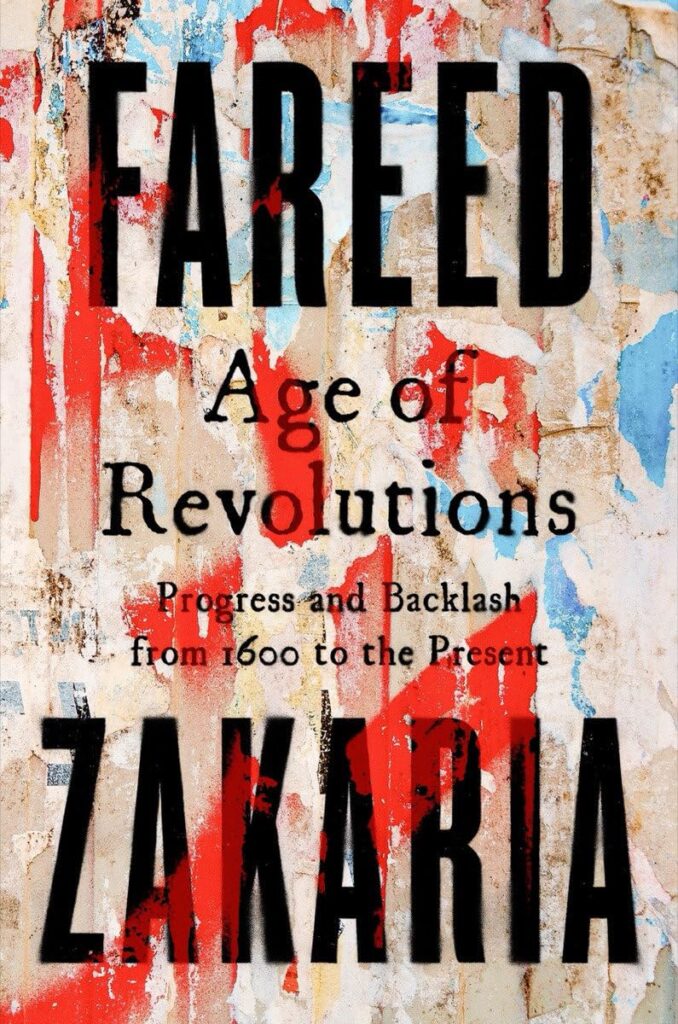Zakaria’s ‘Age of Revolutions’: Fresh Insight from the King of Context

Age of Revolutions: Progress and Backlash from 1600 to the Present
Penguin Random House/March 2024
Reviewed by Colin Robertson
May 24, 2024
Fareed Zakaria’s Age of Revolutions: Progress and Backlash From 1600 to the Present argues that the biggest change in the last 400 years is the rise of liberal democracy. But, as his lively account makes clear, it’s been a bumpy road of “ceaseless action and reaction, progress and backlash”. How we manage the latest backlash will determine the continuing success of our liberal experiment.
Age of Revolutions is a book of two parts. The first half is a historical romp through potted case studies beginning with the 16th and 17th century Dutch triumphs in banking, seamanship, water management and land reclamation. The ‘Glorious Revolution’ saw Dutch King William become Britain’s monarch and stimulated the Industrial Revolution, with its steam engine and cotton gin, in 18th and early 19th century Britain. Britain’s success, in turn, helped launch the remarkable industrialization of rail, telegraph, steel, and electricity in 19th and 20th century United States.
These ‘revolutions’ fundamentally restructured the socioeconomic political basis of their societies. Political reforms gave every citizen the vote, with Zakaria pronouncing the emancipation of women as its most profound achievement.
The second part of the book looks at our current situation, arguing that we are living in another ‘age of revolution’, this time fueled by the convergence of globalization, technological innovation, cultural change and a glut of not-always-reliable information.
Change is coming at us more and more rapidly. But change, writes Zakaria, inevitably provokes a “deep backlash” because “freedom and autonomy” come at the expense of “authority and tradition”. This includes disruption to community and personal identity.
With the advent of the internet and social media, we celebrated its potential to connect the world and resurrect communities. But while we may be more connected than ever, studies say we are also more lonely and more anxious.
Zakaria says he began thinking about this book as he looked more closely at the Tea Party movement. While economic insecurity was part of their grievance, their biggest fear came from cultural issues, including multiculturalism, ‘wokeness’ and, in particular, immigration.
Waves of migration to US and to the West are accelerating because of climate change, poverty, and political instability. No single issue animates modern populism as much as uncontrolled migration. To the average citizen it appears to be unmanageable. This anxiety is central to populist movements, both right and left. Zakaria says Western leaders need to reform and agree on an immigration regime that is seen by all as rules-based and fair.
Change also affects geopolitics. Even if Xi Jinping and Vladimir Putin believe that democracies are spent, they worry about the influence of ‘Western values’ and so they are reasserting national interests and culture over democracy, cosmopolitanism and globalization.
Zakaria has built a distinctive analysis brand in a glut of opinion by being the king of context.
Looking at the historical record, Zakaria observes that the end result of the violent upheavals and imposition of radical ideas from above that characterized the French, Russian, and Chinese revolutions was social chaos, widespread violence and, ultimately, dictatorship. For reform to stick, says Zakaria, change needs to be gradual and organic. He offers policymakers this advice:
“Don’t impose change from above. Instead, work within the fabric of society, with actual communities and people, to educate, persuade, and convince them of your cause. Don’t give up on freedom of speech just because at any given moment you despise a message that is spreading far and wide. Don’t be seduced by identity politics—which is fundamentally illiberal, viewing people as categories rather than individuals. Moving too quickly and too forcefully will often cause more backlash than progress. Accept that compromise is an inevitable aspect of democracy—indeed, that it is a virtue because it takes into account the passions and aspirations of others.”
Zakaria offers a series of prescriptions to help democracies strengthen family, community and national bonds: To bolster family life he recommends free preschool, subsidized child care, and paid parental leave; to connect neighbours, he argues for local community centers, investing in local schools, and promoting civic participation; to bind nations, he makes the case for national service following high school that would include community and civic responsibilities, working in schools and hospitals, as well as the uniformed services.
While none are new, all fall into the category of gradual and organic.
When it comes to intelligent commentary on international affairs, Fareed Zakaria has established both place and standing. His weekly Sunday CNN show, GPS, is a must-watch for both professional and armchair strategists. Active on the conference circuit, his network is better than most foreign ministers and he probably gets his calls returned faster than most national leaders.
Zakaria has built a distinctive analysis brand in a glut of opinion by being the king of context. Like his Washington Post columns, his books are insightful and digestible. Ten years in the making, Age of Revolutions meets the standard of his earlier The Post-American World (2008, 2011). If, after reading Age of Revolutions, policymakers think twice about the implications of a policy initiative, then Zakaria will have achieved his objective.
Contributing Writer Colin Robertson, a former career diplomat, is a fellow and host of the Global Exchange podcast with the Canadian Global Affairs Institute in Ottawa.
